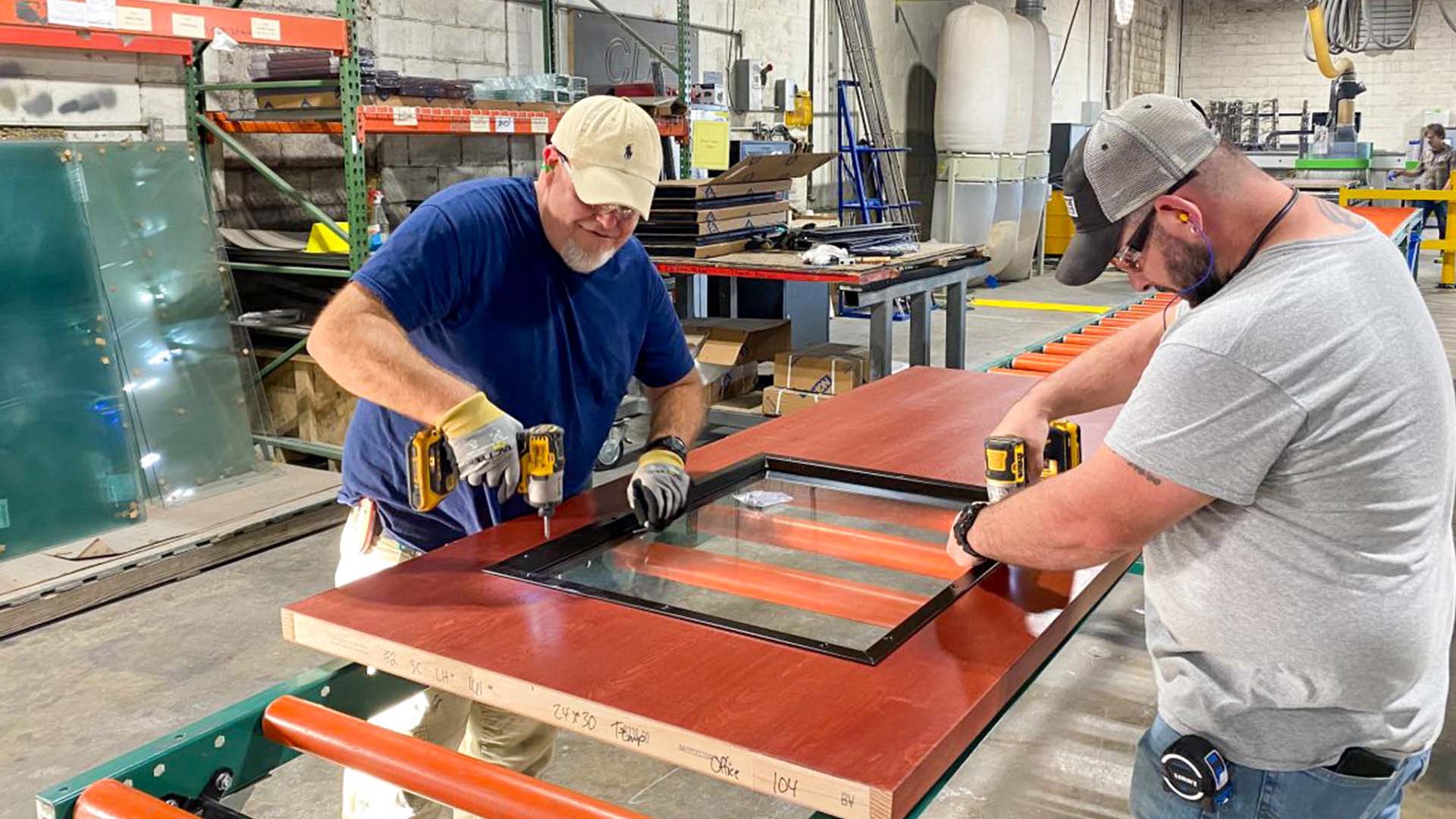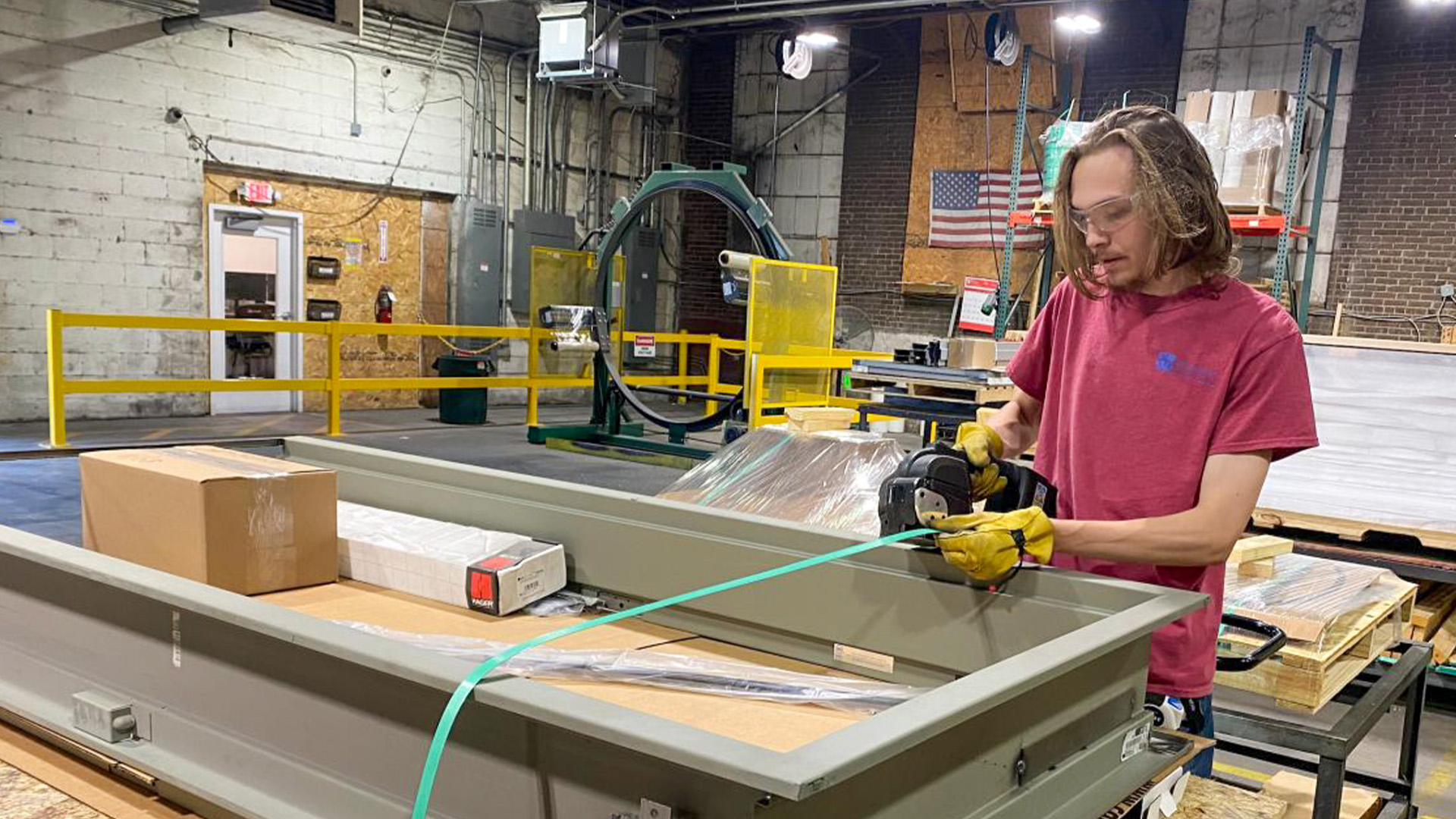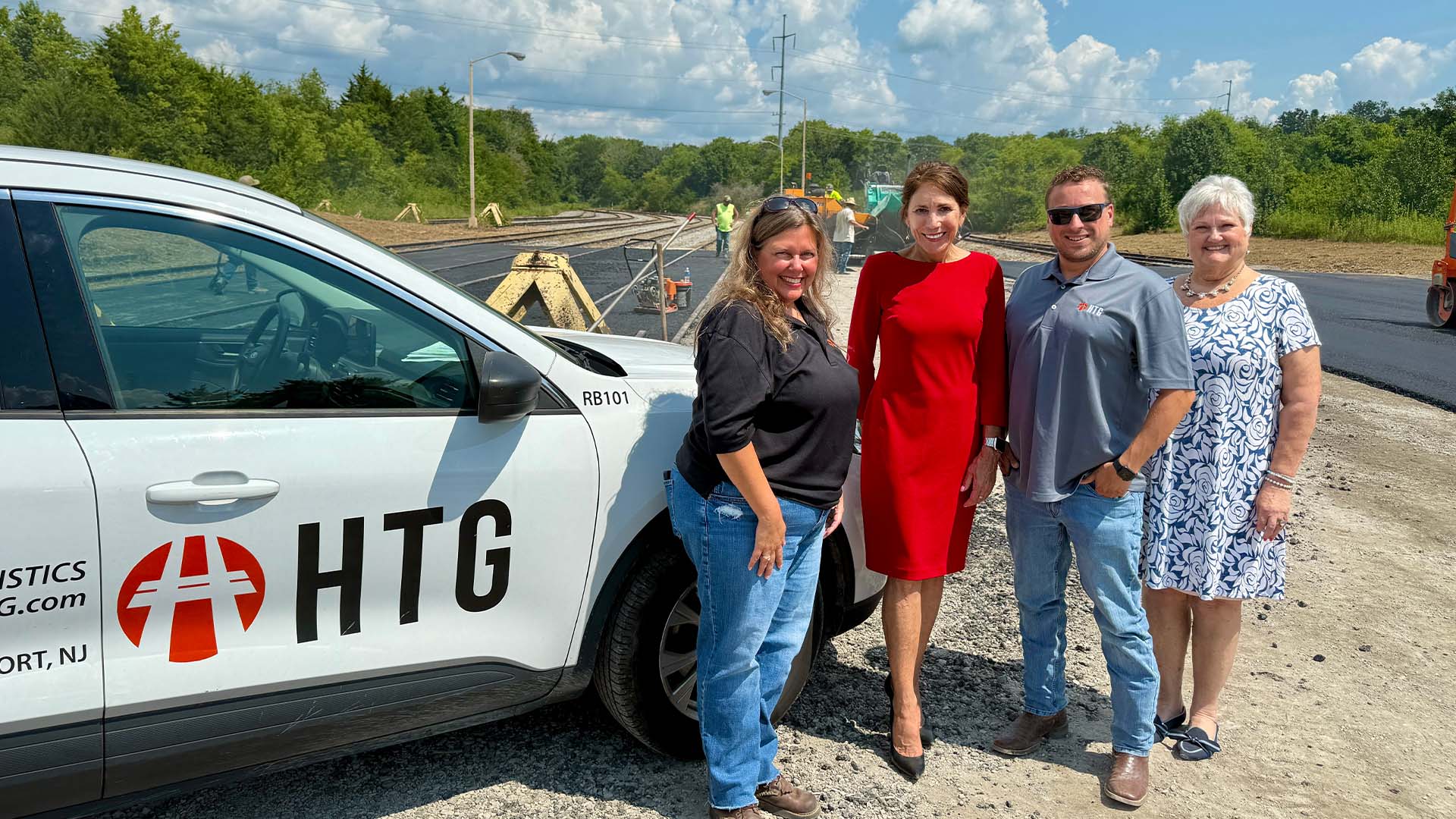Why Facebook is Pouring $800M Into This Farmland

By Adam Sichko – Senior Reporter, Nashville Business Journal
The call came as James Fenton was driving, and he didn’t waste time when he arrived at the office. He grabbed the first piece of paper he could find, an envelope bearing the mark of the Gallatin Economic Development Agency, where he is executive director.
“BE PATIENT!” he wrote. A contact had just told him that the company Fenton was chasing — a potential $800 million investment from what Fenton believed to be a Fortune 50 tech titan — had stopped pursuing a competing site in Middle Tennessee.
Fenton tacked the vague note on the message board in the front office for his two employees to see. It was Feb. 26, 2019, and it was the first time Fenton sensed a clear path to recruiting the company. He knew all about patience: It had been 18 months since he had signed a non-disclosure agreement to protect information tied to a code-named data center. In that time, the potential project had landed two hours away, then was revived when the company decided to build another one. It wasn’t the first moment when Fenton was sure his chances had died.
From that phone call on, Fenton would win the required approval of 61 people, from the president and board of trustees at the University of Tennessee 170 miles away to the board of Gallatin First United Methodist Church, across the street from his office. And that was just to ensure the company could buy 45% of the 809 acres of land it wanted. That headcount nears 80 when adding in other landowners and the Gallatin City Council, plus the board of a tiny neighboring water utility district, where Fenton arranged a persuasive show of force.
The Herculean effort corralled a blockbuster deal three years in the making: Facebook Inc. is building a nearly 1 million-square-foot data center that will become the largest taxpayer in Sumner County, even after factoring in 20 years of tax breaks. The state’s 17th largest city has landed the seventh-biggest private investment in at least the past decade, according to state data. Facebook is the kind of brand name that can buoy corporate recruiting efforts in the Nashville region. These are the kind of tech-jobs-of-the-future that so many communities covet, with future Facebook employees earning an average of $80,000 a year — almost twice the average wage in Sumner County.
The data center likely will stand as Greater Nashville’s signature economic development deal of 2020, a year marred by a global pandemic and staggering job losses. Facebook’s seismic arrival in Gallatin is poised to propel the community beyond its traditionally industrial economy and reinforce the fact that what’s often shorthanded as “Nashville’s” growth is most pronounced in the counties surrounding the state capital.
“I never, never would have thought this was possible. Beretta was the big thing, up to this point,” said Dewayne Scott, a Gallatin native and longtime businessman and entrepreneur in the city. “This will set the tone and pace, forever, in Gallatin.”

High-tech Over Headcount
Before Facebook, Beretta was Gallatin’s highest-profile recruitment. Other employers were much larger, such as a Gap distribution hub or Servpro Industries Inc., which relocated its building-repair business from California in the 1980s. But Beretta, the world’s oldest firearms manufacturer, carried a distinct cachet in late 2013 when the Italian company announced that its U.S. production would move from Maryland.
Beretta and other companies discovered that skilled workers were scarce. Wages kept rising as the region’s unemployment rate plummeted below 4% and then sunk below 3%.
“If I’d have announced another 300 jobs coming to town, my existing industry would have run me out of town,” Fenton said.
In March 2017, Gallatin began pursuing a new strategy of fewer but better jobs — high-tech over high headcount. To boost the workforce pipeline, Fenton worked with the Greater Nashville Technology Council to bring the specialized Apprenti program to the Gallatin campus of Volunteer State Community College. The city adopted a strategic plan that specified the desire to attract tech companies. Fenton attached a GoPro to his dashboard and documented the ease of his morning commute from his home in Green Hills to his office in Gallatin.
“It was really about moving away from manufacturing, lower-paying jobs,” said Scott, who sits on the board of the Gallatin Economic Development Agency. “Now, if there’s not a $20-plus-per-hour job, we’re not interested in them coming.”
Also in March 2017, Facebook registered the entity Woolhawk LLC in the state of Delaware. That would become the legal entity that the social media giant, with 3 billion users worldwide across platforms including Instagram and WhatsApp, would later use to pursue its Gallatin project.
Five months later, Tennessee Valley Authority officials brought executives from an anonymous prospect — then identified as Project Skillet — to Fenton’s office. They drove five miles to a roughly 370-acre farm Fenton had identified as a top prospect for development. It was near the Beretta factory, with ample power, water and sewer capacity nearby.
“I got a little bit of a hint [of their size] when they said they might like the farm next to it also,” Fenton said.
It was the first, and only, time that Fenton went to the site with the company. He estimates they made about a dozen visits over the entire recruitment, dropping by his office to chat before heading out on their own.
Facebook wound up choosing Huntsville, Alabama. But officials returned to Gallatin in May 2018 to resume conversations — a month before formally announcing the Huntsville selection.
“Even though we decided to go with Huntsville, we always kept Gallatin as a very strong presence in our mind,” said Bobby Hollis, Facebook’s director of global energy, environment and site selection. “We look for places we know we’re going to be in for decades to come. We knew it would make sense for our portfolio.”
Between those first two visits, Fenton dug deeper into the ownership of the farmland he pitched to the company. It was controlled by a trust established 75 years before, which outlined a three-stage process should the last living heir decide to sell the land. The trust gave the University of Tennessee the first shot to control the land and use it for what the trust called “agricultural experimentation.” If the university didn’t want it, Sumner County would have the chance to benefit by using it for the same purpose. If the county passed, Gallatin First United Methodist Church was next in line.
Fenton had lunch with then-university president Joe DiPietro, who indicated the university would be fine giving up its right to the land. Four days later, he emailed to say the opposite.
“Effectively, right there, the deal was dead,” Fenton said.
Fenton waited. UT was going through major change, as then-Gov. Bill Haslam led an effort to shrink its board from 27 members to 12. In September 2018, DiPietro announced his retirement; the revamped board tapped as interim president Randy Boyd, who had served as the state’s economic development chief for all of 2015 and 2016.
In June 2019, UT’s board of trustees voted to approve a sale of the Gallatin land to Woolhawk LLC. Proceeds would be used for agricultural purposes.
“This is a very highly complex arrangement with a lot of moving parts,” David Miller, the university’s chief financial officer, said at the June meeting. “It may or may not actually occur, as there are other sites under consideration.”
He was right. For a time, according to multiple sources, the company had scouted Clarksville, which is roughly 45 miles northwest of Nashville and is now home to a $600 million Google data center.
The Sumner County Commission also greenlighted the proposed sale, relinquishing its right to the property. Then one evening, Fenton walked across Main Street to meet the finance committee of Gallatin First United Methodist Church. What he thought would be the easiest step proved to be the most delicate: Fenton was surprised to learn there was “tension,” as he described it, between church members and the last living heir of the farmland.
“I obviously just had to say, ‘Sorry, I had no idea. What would make this feel good and work for you?’” Fenton said. “There was some negotiation there, but I think in the end, they were made whole.”
‘Gallatin Made Perfect Sense’
Not all the deals were complicated. Facebook was eligible for state incentives but opted not to accept them. Ott Gregory, who owns 235 acres of adjacent land, set his price at the outset of his talks with Facebook: $8.26 million. The company never tried to haggle, Gregory said.
Then the Covid-19 pandemic hit. That unexpected twist brought another: Instead of sidelining the project, the pandemic sped it up, as more Facebook users turned to social media to stay connected in a world of shutdowns, canceled trips and events, and work-from-home.
“As the urgency of this year came about … Gallatin made perfect sense,” Facebook’s Hollis said. “We needed things that could move fast and this definitely fit that bill. The city and the mayor especially were very proactive in reaching out and making sure we knew the site was ready to roll.”
Almost. Facebook’s data center, shaped like a capital H, was 40 feet over the boundary between Gallatin’s utility district and the Castalian Springs-Bethpage Water Utility District. In early summer, Facebook officials told Fenton they weren’t moving ahead until that far smaller utility agreed to let Gallatin service the full data center. Facebook needed to reserve up to 1 million gallons of water a day to cool its servers. Castalian’s capacity over its entire system was not quite 900,000 gallons.
“It was the second time I felt the project was dead,” Fenton said.
Fenton brought Gallatin Mayor Paige Brown, a state senator and Bobby Rolfe, the state’s commissioner of economic and community development, to a Castalian board meeting to, as Fenton said, “communicate how important it was that we get this done.” The parties negotiated a franchise fee for the district.
Another Nashville player stepped up: Silicon Ranch Corp., which is building a solar farm in Jackson to help TVA meet Facebook’s mission of powering the data center using only renewable energy.
“The real transformation is these corporate clients saying, ‘We really want to make sure the grid is getting cleaner based on the fact that we’re here,” said Matt Beasley, chief commercial officer at Silicon Ranch. “For us to be successful as a region in recruiting, we’ve got to have that part of the puzzle solved. Facebook is not investing in Gallatin if TVA didn’t figure out a way to get them what they needed. Otherwise, they’ll go elsewhere.”
The only thing the pandemic sidelined was the groundbreaking ceremony. An unexpected delivery arrived at Gregory’s home one day, which now hangs on his wall: a shovel emblazoned with the name “Facebook.”
Asked what Facebook’s arrival means for Gallatin, Gregory said: “I have no idea, because we’ve never had a project that big. Very few people have, unless you’re in a large city.”
Brown, a Gallatin native, thinks she has an idea. She lamented how Gallatin’s growth has changed the landscape she was familiar with. Then she remembers that she went to college in Florida because she didn’t see many job opportunities in her hometown.
“The reality is, we’re in such close proximity to such a booming metro that you either embrace what comes with that or you kick and you fight and you lose,” Brown said.
The data center will employ 100 people, and involve 1,100 construction workers at peak activity.
“They are a small employer, relatively. I’ve felt compelled to explain that to some people,” Brown added. “You’re not changing the makeup of your population based on that one company.”
Three years into the push for tech jobs, Fenton now says Gallatin is tapped out when it comes to data centers. Before Facebook landed, Archer Datacenters began construction on a 70,000-square-foot facility where companies can lease server space.
“A community our size, I think that’s enough,” Fenton said. “The impact of this is that I can knock on doors and they’ll open them. Before, I’d have gone out knocking and these companies probably wouldn’t have opened them. This is now part of our calling card.”
Aside from Fenton, Scott may have had more access to Facebook than anyone in Gallatin. He spoke to Silicon Valley-based executives for two hours as he taped an interview for a video announcement Facebook published at 6:01 a.m. on Aug. 12, formally revealing the Gallatin project.
“One of my pushbacks to them was, you’re the 800-pound gorilla coming to town, but you’re not the savior of the community,” Scott said. “You guys can add to where we’re trying to go and get to, but … you have to have corporate humility. If it’s going to be like you are the end-all be-all, that’s not going to end up well.”
Gallatin’s identity change is real and underway, Scott said. He acknowledged it’s causing some friction in the community, with others content to stick with its industrial and rural roots.
“People do see that eroding or going away. That’s part of the growing pains. I’m excited and ecstatic. For me it’s all about trying to embrace change,” Scott said. “My thing is, let’s listen and then watch what they do. Right now, I see genuine effort.”
Scott’s phone was buzzing after Facebook made its arrival official. So was Fenton’s, but you could not reach him that Wednesday morning. He had hit the road on one of his Harley-Davidsons for a long-planned vacation.
“If you’d have been behind me, hammering down the highway, riding as hard as I could, I was screaming at the top of my lungs, ‘Facebook!’” Fenton said. “It was the first time I’d been able to say that word in three years.”
Download Our Relocation Guide
Gallatin is dedicated to providing high-quality partnerships to businesses looking to relocate to our community. Dowload our Relocation Guide for more information.






